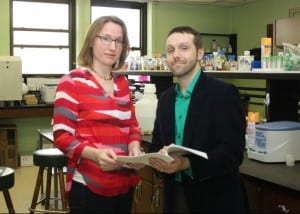WEST LIBERTY, W.Va., Feb. 9, 2016 — It’s a milestone when professors see their research published for an international audience in a peer-reviewed journal. West Liberty University Assistant Professor of Biology Dr. Joseph Horzempa is enjoying just this sort of achievement since his study was published in the January 2016 issue of Frontiers in Microbiology which publishes articles on outstanding discoveries across the entire spectrum of microbiology, according to its website.

High school teacher and alumna, Kathy Loughman, enjoyed the rare opportunity to be the lead author on the published research of Dr. Joe Horzempa in his Arnett Hall laboratory.
Representing three years of work, the study took countless hours in his Arnett Hall laboratory and included nine student interns. Its intimidating title is: Temperature-Dependent Gentamicin Resistance of Francisella tularensis is Mediated by Uptake Modulation.
What’s even more special is that the lead author in the research paper was John Marshall High School biology teacher Kathy Loughman, who is married to Associate Professor of Biology Dr. Zachary Loughman. She also is a WLU alumna and was pleased to have the chance to take part in Horzempa’s work.
“For two summers, Kathy and several of my students investigated how Francisella tularensis and other bacteria are able to resist taking up certain antibiotics at lower temperatures. Mrs. Loughman was awarded a fellowship that provided her with this research opportunity. She got to work in the lab with several West Liberty students, including a few who are John Marshall graduates,” explained Horzempa, who joined WLU in 2011.
“As a secondary science educator, the opportunities to do real-world science and take that experience back to my classroom is invaluable,” said Loughman, who has been a high school teacher for nine years.
Horzempa has been delving into the intricacies of this bacterium since he was a postdoctoral researcher at the University of Pittsburgh School of Medicine from 2006 – 2011.
“This work presents the novel observation that Francisella tularensis bacteria are more resistant to particular antibiotics (called aminoglycosides) at lower temperatures associated with soil and environmental habitats compared to mammalian body temperature. We showed that this resistance was a result of diminished antibiotic uptake at the lower temperature. Other diverse pathogenic bacteria exhibited similar enhanced resistance at the lower environmental temperature, suggesting that the temperature-dependent uptake of aminoglycosides is generalizable. We hypothesize that bacteria experiencing both a pathogenic and a temporary terrestrial life cycle may have evolved to utilize low temperature as a cue to resist antibiotic uptake. This would allow for enhanced survival during co-habitation with competing bacteria that produce antibiotics,” he explained.
WV-Idea Network forBiomedical Research Excellence (WV-INBRE), a competitive federal research program established by the National Institutes of Health in 2004, awarded the fellowship to Kathy Loughman.
Dr. Horzempa’s next step is to identify the transporter that is responsible for the uptake of the antibiotic.
“If we are able to discover the transporter, then we should be able to find a drug that targets that transporter to enhance the antibiotic uptake and increase the susceptibility of the bacteria,” he said. This discovery would have applications for other bacteria beyond Francisella tularensis.
“As an undergrad I’m honored to advance my career at such an early stage at West Liberty through my involvement in this published research,” said student researcher Alek Florjanczyk, who graduated this past December with a degree in biology and is now going through the steps of getting into grad school. He hopes to go into plant pathology as a career.
A native of Wheeling, Florjanczyk came to WLU after earning an associate degree at West Virginia Northern Community College. Other students involved in the research include: Jesse Hall, Samantha Knowlton, Devin Sindeldecker, Tricia Gilson, James W.M. Birch, Tara Gajtka, Brianna N. Kobe, Jenna Ingram.
Dr. Horzempa’s post-doctoral research associate, Dr. Deanna Schmitt, assists in the studies in a variety of ways, doing experiments and mentoring the undergraduates.
“What’s unique about this study is that it involved so many of our undergraduates with hands-on lab projects. The study is novel and important certainly, but from my standpoint it is especially gratifying that so many of our students were engaged in the research,” said Schmitt.
The biology department is housed in the College of Sciences and offers several opportunities for research in a variety of labs. For more information, please visit westliberty.edu or call 1.866.WESTLIB.
The post Outstanding Research involves Alumna, Students appeared first on News & Media Relations.
The post Outstanding Research involves Alumna, Students appeared first on Current Students.